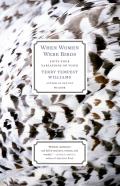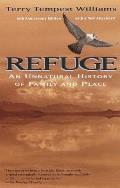
To write is to breathe. I don't think about it. It's like oxygen. But if you take it away from me, I will suffocate. I need the blank page as the landscape upon which I stand, to think, ponder, consider, rant, rave, reveal, question, and explore where I have been, what I have done, and what the world is holding at any given moment. It is my habitat for images, secrets, stories, notes, facts, figures, lists, calendars, quotes, dialogue, epiphanies, and, most importantly, an honest accounting of the mundane. Each of my journals is a compass point, a daily orientation, my North Star.
When people ask me if I write every day, I say, "No," and that is the truth. But today, as I write about keeping a journal, I see it reveals a deeper truth that swings on a lie that I did not recognize until now. I do write every day, but in my mind, this writing doesn't count because it is the writing I do in my journal: daily, private, and for myself.
Why do I so readily discount the power of this practice, the dailiness of my devotion, the attentiveness of my descriptions? Why do I keep secret the one disciplined act of my life? Keeping a journal is akin to housework, necessary and redundant. But maybe that is not even true.
As an experiment, I went into my bedroom at my father's home in Salt Lake City, where I stay periodically, and searched for a journal, any journal. I found three. Here are random excerpts from each:
October 5, 1988The wind blows. The silence grounds me, stills me, slows me down. Refuge in the land, in myself, in those who have gone before me.
Mimi stands in the center of the four Sun Tunnels, her hands in the pockets of her Levi's — She has hardly spoken a word since we got here...She keeps turning...looking outward in each direction.
"It's the timelessness," she says, "that gets me."
Mimi walks south. She is a lone figure on the horizon. I watch her put her right hand up to her
ear — I wonder what she is hearing.
Peace blows through this country.
As I turn to leave — Mimi has disappeared and I am alone in the middle of the salt desert.
I am not afraid.
August 20, 2010Framing the Gulf
We have created a terminal condition.
We don't want to know the costs of our actions.
We don't want to see the results of our inaction.
I am angry. I am outraged. I am in love with this broken world.
The oil is not gone. People are sick and one billion birds are migrating through the Gulf of Mexico as they have always done, generation after generation. Only this time, the blowout from Deep Water Horizon has created a terrible beauty of exploding values.
22 December 2012The world did not end and we are still here.
Yesterday I wrote: "Today is the last day of the world," so say the Mayans. I believe them. The world as we know it is ending. What has been peripheral will become central. What has been tolerable will be intolerable. And our own gifts held close, must now be freely given. May we meet the future's penetrating gaze with honesty, courage, and a redefinition of love.
This is where I am as I sit peacefully in our living room with candles lit. It is five o'clock and a winter twilight is deepening. Just read Zadie Smith's essay on joy. Loved the ideas and this one line from Julian Barnes: "It hurts just as much as it is worth."
Three journals, three excerpts from three different years.
Here is the back story of the first journal: In 1988, my mother had been dead for one year. Cancer. My grandmother and I had gone out to the Sun Tunnels, Nancy Holt's piece of land art located in the Great Basin in the salt desert, west of Great Salt Lake. In 1989, one year later, my grandmother would be dead. Cancer. This was a moment, our moment of pilgrimage and reflection, later revisited in Refuge: An Unnatural History of Family and Place.
The second journal was my notebook from July 2010, when I was on assignment for Orion magazine to cover the BP oil spill. I was struggling to figure out how I could frame the evolving story saturating the Gulf of Mexico.
The third journal is my current journal, the one I carry with me wherever I go.
My journals and notebooks are more than record keeping; they are sketchbooks, explorations, conversations on the page that I may or may not return to. What they all have in common is that they are the repositories of my attention. Each sentence written by hand belongs to a moment in place. There is an immediacy in my journals that I cannot recreate elsewhere. And there is a lack of self-consciousness because it is written only for me, "food for thought," as they say, undigested and raw.
Virginia Woolf wrote:
What sort of diary should I like mine to be? Something loose knit and yet not slovenly, so elastic that it will embrace anything, solemn, slight or beautiful that comes into my mind. I should like it to resemble some deep old desk, or capacious hold-all....to reflect the light of our life, and yet steady, tranquil compounds with the aloofness of a work of art.
My mother left me journals, and all her journals were blank. My mother's journals are a work of art, each one a performance piece. She filled her journals with silence, the ringing silence of emptiness. I will never know what she was trying to say or not say by choosing to write nothing.
Yet after 25 years of wondering why my mother chose the authority of the empty page to represent her voice over the authority of her own words, I wonder if we are ever able to articulate the truth of our lives, the depth of our longings.
Let me rewrite this sentence, replacing the word "able" with "willing": I wonder if we are ever willing to articulate the truth of our lives, the depth of our longings.
 Who doesn't feel the reader's gaze upon each word we write in secrecy?
Who doesn't feel the reader's gaze upon each word we write in secrecy?
And now, let me rewrite this sentence and replace "gaze" with "judgment": Who doesn't feel the reader's judgment upon each word we write in secrecy?
Here is my confession, dear reader: my journals are less revealing than my books.
Why? Because I believe my journals will be read just as I have read other women's journals — my great-grandmother's journals and my grandmother's journals through the generations.
Isn't this the point? This is what I was told and taught as a Mormon girl. We write to make a record, an accounting of faith and endurance alongside the daily happenings of a life. To keep a journal is to create a personal testament of change.
Richard Jefferies, the British naturalist and mystic, writes, "The truth is, we die through our ancestors; we are murdered by our ancestors. Their dead hands stretch forth from the tomb and drag us down to their mouldering bones."
My mother left me her journals and all her journals were blank. Was this an act of privacy or an act of defiance; a hostile gesture or a protective one? If my mother had spoken honestly, freely about her emotional landscape, she would have betrayed those she loved and so she remained silent. She left me a koan, a mystery that I will ponder every day of my life.
My mother's journals remain a revelation.
My journals are less revelatory than my books. I believe my journals may be read and that my books will remain private. This is the truth I tell myself in order to be able to write for others. This carries its own empirical logic, as I have never seen anyone read anything I have ever published. My journals are the seedbed of ideas of the books I write.
I believe what Virginia Woolf wrote in her journal on March 9, 1920:
"In spite of some tremors I think I shall go on with this diary for the present. I sometimes think that I have worked through the layer of style which suited it — suited the comfortable bright hour....Several good books can be written still; and here's the bricks for a fine one."
Bricks and mortar aptly describe my journals. But what am I building besides the scaffolding of memory? Perhaps the difference between keeping a journal and writing a memoir is one of revision and shape.
In a journal, I am recording a moment. In a memoir, I am reimagining it. In a journal, one word follows another. In a memoir, one word follows an idea. In a journal, what gets written down is dictated by the day. In a memoir, what gets written down is dictated by an overarching design. Both keeping a journal and writing a memoir require presence and discipline. It is an ongoing dance with truth, what to share and what to withhold. Choices. Do I tell it straight or sideways? Do I write in code and image to remind me what remains simmering underground? Or simply write on, word by word, not thinking about anything but my personal commitment to engage on the page?
There is always the option of burning pages — which I have done repeatedly.
To write is to breathe. I said this before. It was the first sentence of this conversation. We repeat ourselves and it is important that we do; otherwise, how do we come to know what we think or feel or ever find the courage to change? Page after page, it is the very redundancy of our lives that gives us the confidence to keep going and embrace "the vitality of the struggle." Repetition is the first truth of keeping a journal. It is not only why we write in our journals, it is why we find such pleasure in reading them. They make us feel less lonely in the world. Ah, I feel this too. So did she. Right here, this sentence, on the page. This is what keeping a journal is, what housework is, what any work requires if we are to develop a consciousness around craft, be it making a beautiful sentence or making a bed. We do the mundane practices of our work over and over again, quite simply out of the paradox of duty and love.